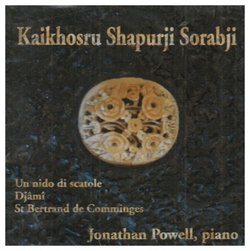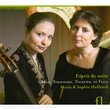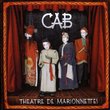| All Artists: Kaikhosru Sorabji, Jonathan Powell Title: Kaikhosru Shapurji Sorabji: Un nido di scatole; Djâmî; St Bertrand de Comminges Members Wishing: 3 Total Copies: 0 Label: Altarus Original Release Date: 1/1/2007 Re-Release Date: 10/23/2007 Genre: Classical Styles: Chamber Music, Historical Periods, Classical (c.1770-1830) Number of Discs: 1 SwapaCD Credits: 1 UPC: 076958708220 |
Search - Kaikhosru Sorabji, Jonathan Powell :: Kaikhosru Shapurji Sorabji: Un nido di scatole; Djâmî; St Bertrand de Comminges
 | Kaikhosru Sorabji, Jonathan Powell Kaikhosru Shapurji Sorabji: Un nido di scatole; Djâmî; St Bertrand de Comminges Genre: Classical |
Larger Image |
CD DetailsSimilar CDs
|
CD ReviewsUn nido di scatole: Sorabji's Carnaval Alscribji | Washington, D.C. | 10/16/2008 (5 out of 5 stars) "Jonathan Powell delivers a powerful and soaring rendition of Sorabji's Un nido di scatole, "A Nest of Boxes," completed in January of 1954, a piece I've never heard and, to my knowledge, has never been recorded till now. This title owes its origin to Sorabji's penchent for collecting small carved or ornamented boxes, many of which surrounded him in his music room or parlor. We owe Jonathan Powell much gratitude for his introducing us to never-before-recorded Sorabji repertory. Un nido di scatole is reminiscent of Schumann's Carnaval, little character pieces that vary material from the opening thematic material. I can't help but notice that the first 3 notes of Un nido di scatole ring of Mussourgsky's Pictures at an Exhibition. Next to the Concerto for solo piano, Un nido possesses pianistic acrobats that sound impossible, but Powell pulls it all off with tremendous, clear, and tasteful technique. The music is pure Sorabji: enchanting, "other-worldly" sounding, whirling right-handed dirvishes and rolling left-handed descents down the keyboard, and nocturnal. Sorabji seems to weave every one of his musical flavors and techniques into this one piece, Un nido di scatole: excesses of OC, nocturnal mists of Gulistan, varied chromaticism, filigree everywhere of detailed etchings into a small ivory box that might have been in his collection; in short, Un nido di scatole is Sorabji's "Medicine Chest," a variety of everything that Sorabji was pianistically and musically about. Powell's performance of Un nido is probably the best performance of a Sorabji piece he has committed to tape (CD!), next to the Concerto. Two other pieces are found here: Djami, Sorabji's second great nocturne that is preceded by Le jardin parfume, and that he would follow up later with Gulistan, and St Bertrand de Comminges ("He was laughing in the tower"). Powell's Djami is certainly a favored performance, next to Michael Habermann's version. I believe that Powell's performance of Djami is better than his performance of Gulistan (Charles Hopkins' Gulistan remains the gold standard). There are several recordings of "he was laughing in the tower" and Powell's recording, heard here, is, in my opinion, the best version there is available. I never knew that you could hear this piece in the way that Powell plays it on this CD. Powell really brings out dimensions of the piece that I never knew existed; much in the same way that a drop of water affects a shot of 18 year-old Macallan single malt. If you are looking for something new in solo piano music, something exotic but good, then look no further than to Powell's performance of Un nido di scatole, Djami, and St Bertrand de Comminges!" Hearing Sorabji Bruce R. Campbell | Washington, DC | 05/31/2008 (5 out of 5 stars) "I don't know whether I'm the only one who hears Sorabji this way or not, but here goes. Sorabji seems to me unique in two ways. The first is a sense of depth - and I don't mean profundity, or not that alone. The simultaneous use of two or more tonalities, each in a different part, allows the listener, when focusing on any individual part, to hear the others as a background. The effect is a sort of aural three-dimensionality that I have not encountered anywhere else. The second point is that the complexity of Sorabji's music means that the patterns are harder to find. You sense a coherence immediately, but it may be some time, and many listenings, before you understand why. I think this will keep the music sounding fresh through many hearings far better than most other music. There is always something new to discover (more so, I think, even than in Bach)."
|





